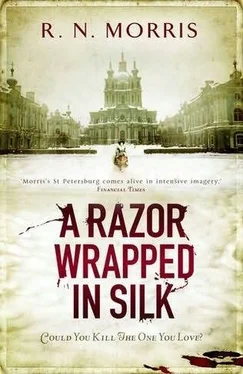R. Morris - A Razor Wrapped in Silk
Здесь есть возможность читать онлайн «R. Morris - A Razor Wrapped in Silk» весь текст электронной книги совершенно бесплатно (целиком полную версию без сокращений). В некоторых случаях можно слушать аудио, скачать через торрент в формате fb2 и присутствует краткое содержание. Жанр: Исторический детектив, на английском языке. Описание произведения, (предисловие) а так же отзывы посетителей доступны на портале библиотеки ЛибКат.
- Название:A Razor Wrapped in Silk
- Автор:
- Жанр:
- Год:неизвестен
- ISBN:нет данных
- Рейтинг книги:5 / 5. Голосов: 1
-
Избранное:Добавить в избранное
- Отзывы:
-
Ваша оценка:
- 100
- 1
- 2
- 3
- 4
- 5
A Razor Wrapped in Silk: краткое содержание, описание и аннотация
Предлагаем к чтению аннотацию, описание, краткое содержание или предисловие (зависит от того, что написал сам автор книги «A Razor Wrapped in Silk»). Если вы не нашли необходимую информацию о книге — напишите в комментариях, мы постараемся отыскать её.
A Razor Wrapped in Silk — читать онлайн бесплатно полную книгу (весь текст) целиком
Ниже представлен текст книги, разбитый по страницам. Система сохранения места последней прочитанной страницы, позволяет с удобством читать онлайн бесплатно книгу «A Razor Wrapped in Silk», без необходимости каждый раз заново искать на чём Вы остановились. Поставьте закладку, и сможете в любой момент перейти на страницу, на которой закончили чтение.
Интервал:
Закладка:
Prince Naryskin was known to be an enthusiastic patron of the arts, as well as a generous supporter of a number of charitable causes. This evening it pleased him to host a gala of literary, dramatic and musical entertainments, to be held in the theatre, for the benefit of Maria Petrovna’s school. It’s true that there were some amongst his circle of acquaintances who questioned the worthiness of such a cause. The argument had been advanced that the inevitable result of educating the poor could only be increased criminality and unrest. A large attendance was therefore not expected, despite the considerable attractions: students from the St Petersburg Conservatoire were to perform a series of interludes devised by their young professor of composition; a number of celebrated authors were to read from their works; and, as a climax to the evening, the distinguished literary gentleman Prince Makar Alexeevich Bykov, recently returned from a prolonged stay in Switzerland, was staging scenes from his play The Vanished Lover . The theatrical performance was to be given added interest by the participation of Yelena Filippovna Polenova, whose engagement to Prince Naryskin’s son Sergei had recently been announced.
So far, the only people gathered in the entrance hall seemed to be those taking part in the proceedings, to judge from the nervous expectancy turned upon Maria Petrovna as she entered. Almost immediately, something like disappointment transmitted itself through the assembly, leaving Maria feeling both aggrieved and at fault. But then she remembered that a highly important personage was rumoured to be attending. The Tsarevich himself had intimated in a letter to Prince Naryskin that he would find time to support the benefit, despite the fact that the cause of educating the masses could not be said to be close to his heart. His interest in the evening remained a mystery, though it was by no means certain that he would put in an appearance.
The atrium was the full height of the palace. A wide marble staircase, transposed from an Italian villa, swept away through a theatrical arch, upwards towards a highly ornate neo-classical ceiling. Most of those milling there appeared cowed by the grandeur of their surroundings, or perhaps by the imminent arrival of the distinguished spectator.
The one exception was the individual Maria recognised as Yelena Filippovna Polenova.
Maria was shocked by the quickening of her own heart. It was seven years since she had seen Yelena and they had not parted on the best of terms. Maria could not claim that she was unprepared for this encounter: she had seen the programme in advance and noted the part of her former school friend. However, the idea of someone in the abstract is far more manageable than their presence in the same room.
She cast around for Apollon Mikhailovich. She was in the habit of referring to him as her rock. Perhaps she said it too often for it to seem quite sincere, and her mentor’s smiles of self-deprecation had recently become tinged with embarrassment, as if he believed himself unworthy of the compliment. Apollon Mikhailovich never could stand flattery, or deception of any kind. When he had been their teacher at the Smolny, he had laid great emphasis on the distinction between deference and fawning. Genuine respect, he had argued, not only allowed honesty, it demanded it. He taught them that they should never be afraid to tell the truth to anyone, no matter how unpalatable the truth to be imparted. Given that he was addressing a classroom of girls, some of whom might reasonably expect one day to be married to — or if not, mistresses of — the most powerful men in the empire, the lesson was not without point. And of course, he taught by example: the respect he afforded them as young gentlewomen was characterised by a candour that was never brutal or spiteful, but neither was it compromised by self-seeking. He taught them the meaning of integrity, and the fact that he deemed them worthy of the lesson awoke in many of them, Maria Petrovna included, the first stirrings of social, and even political, consciousness.
Such was the man she sought out now, but without success. Perhaps he was there, she couldn’t say. Her eyes only saw one person now: Yelena Filippovna.
In anticipation of this meeting, she had practised a few polite words thanking Yelena for her involvement in the evening. Perhaps she also imagined a brief kiss and the warm embrace of friendship renewed. Strangely, however, none of the words she had put into Yelena’s mouth quite rang true, so that there was a stilted falsity to the projected exchange. She now realised that the point about Yelena was that she would always say and do the very thing that no one could anticipate. The realisation provoked a fluttering dread in Maria’s stomach.
The cruellest imaginable thing that Yelena could do now, and therefore surely the most likely, would be to pretend not to remember Maria. Was it really possible that Yelena could bear a grudge after so many years? It little mattered that the grudge was not hers to bear. Yelena had always had a talent for putting others in the wrong. Knowing this somehow gave Maria the courage to face Yelena, and to bear with equanimity whatever construction she might place upon the past.
But before she could approach her, another young woman whose face was familiar to Maria interposed herself between them.
‘I know you,’ said the young woman. ‘You’re Maria Petrovna. You used to be Yelena’s friend.’
Maria was slightly thrown by the abruptness of her manner. ‘Yes.’
‘Don’t you remember me?’
‘Of course I do …’
‘Nobody remembers me. People only remember her. You didn’t even see me when you came in, did you?’ She made her self-deprecating remarks with a forced levity that did nothing to conceal her bitterness. ‘You saw only her.’ The girl who was speaking was handsome enough. The deep ultramarine silk of her gown complimented her pale complexion, though the fashionably tight-fitting dress did not sit altogether happily on her. She seemed to regret the boldness that had led her to choose such a plunging neckline, which left her pale shoulders and much of her bosom exposed. The usual adjectives of feminine attractiveness — such as pretty, charming — somehow did not apply to her. Her expression was not quite harsh, but it was sharpened by something that could have been hostility — or simply unhappiness.
‘But I do remember you, Aglaia Filippovna,’ insisted Maria.
Aglaia Filippovna smiled begrudgingly before narrowing her eyes in suspicion. She formed her mouth to speak but let it go.
The entrance hall was filling up. The performers began to relax, gratified to see their audience build. As they welcomed friends, the collective mood was transformed to one of excited volubility.
‘Will you be taking part in the evening’s entertainments?’ asked Maria.
‘I leave that to others.’
‘It is very good of you to show your support, at any rate.’
‘I hope that it will not be unduly tedious. Prince Bykov is rather too earnest to be amusing.’
‘I believe his play, in which your sister has the leading part, addresses the woman question, as well as other important issues of the moment.’
Aglaia’s voice sank to a murmur: ‘You could not help looking at her even then, when you mentioned her. You always did have the most awful crush on her. Yelena used to laugh about it.’
Maria felt herself blush and bowed her head. She could not speak.
‘You were not the only one. It’s the same now, except that it is men who are her admirers.’
Despite herself, Maria cast a furtive glance in Yelena’s direction. Aglaia’s words seemed to be confirmed by the semi-circle of men now grouped around her sister; however, Maria could not be sure that it was admiration she saw in every face. She detected a kind of hunger in some of them, but a hunger conflicted by the dark emotions of hatred and fear. It was the kind of hunger felt by a man who knows the food he craves is poison to him. Only one man, an older gentleman with snow-white hair and imperial beard, gave the impression of being immune to her, and yet even his complacency was guarded, as if it held within it a secret store of desire. He seemed to be showing her off to the younger men. His smile was proprietorial. He watched their reactions avidly and seemed to take pleasure in the hold she had over them.
Читать дальшеИнтервал:
Закладка:
Похожие книги на «A Razor Wrapped in Silk»
Представляем Вашему вниманию похожие книги на «A Razor Wrapped in Silk» списком для выбора. Мы отобрали схожую по названию и смыслу литературу в надежде предоставить читателям больше вариантов отыскать новые, интересные, ещё непрочитанные произведения.
Обсуждение, отзывы о книге «A Razor Wrapped in Silk» и просто собственные мнения читателей. Оставьте ваши комментарии, напишите, что Вы думаете о произведении, его смысле или главных героях. Укажите что конкретно понравилось, а что нет, и почему Вы так считаете.












